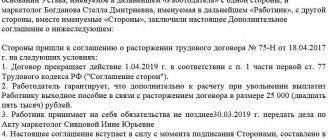Home / Labor Law / Dismissal and layoffs / Dismissal
Back
Published: 04/23/2016
Reading time: 8 min
0
8889
The dismissal of employees of the Ministry of Internal Affairs is regulated by the provisions of the Federal Law “On Police” (Article 40). Also, departure from service as a result of complete or partial loss of ability to work is provided for by the Labor Code (Article 83, paragraph five).
In general, dismissal is formalized according to general labor standards, but it also has its own characteristic features. For example, an employee has the right to receive special one-time benefits (Federal Law number 274, article 7) and compensation (Federal Law number 3, article 43, part five).
- What is the reason for dismissal?
- Dismissal procedure
- What payments are due?
- Is the job safe?
REGULATORY FRAMEWORK GOVERNING DISMISSAL
The dismissal of employees from the Ministry of Internal Affairs (MVD) of the Russian Federation is regulated by the following regulatory documents:
- Federal Law of February 7, 2011 No. 3-FZ “On the Police”, namely Article 54;
- Regulations on service in internal affairs bodies, approved by Resolution of the Supreme Council of the Russian Federation dated December 23, 1992 No. 4202-1[1];
- Instructions on the procedure for applying the Regulations on service in the internal affairs bodies of the Russian Federation, approved by order of the Ministry of Internal Affairs of Russia dated December 14, 1999 No. 1038[2];
- Clause 5 of Article 83 of the Labor Code of the Russian Federation.
LABOR CONSULTANT
serious disturbances in the activity of the heart, for example, frequent jumps in blood pressure or pulse, etc.;
The health of employees of the Ministry of Internal Affairs must be checked regularly based on current rules and regulations. For this purpose, a special commission is created that evaluates the progress of the audit and constantly monitors this procedure. This body gives a final opinion regarding the health status of each employee.
GROUND FOR TERMINATION
The basis for the dismissal of an internal affairs officer due to a deterioration in his health is the conclusion of a military medical commission. This conclusion may be issued if the following problems exist:
- Functional diseases of the respiratory system;
- Diseases of the cardiovascular system;
- Oncological diseases;
- Disorders of the musculoskeletal system;
- Nervous system disorders and mental disorders;
- Serious vision problems;
- Infection with the human immunodeficiency virus or the presence of acquired immunodeficiency syndrome.
Reasons
Workers in various fields are fired for a variety of reasons, for example:
- At the personal request of the employee. Each person has the right to decide for himself who to work for and for what money, so it is considered normal to look for exactly the place where it would be convenient and comfortable to work and get decent money.
- At the initiative of the employer. The employer is satisfied with the employee when all orders are followed, discipline is not violated and efficiency increases. If there is any dissatisfaction with the employee, then the head of the office has the right to “ask” the unwanted employee, on the basis of one of the articles of the Labor Code of the Russian Federation.
- Due to inconsistency with the position held. These reasons include both illness incompatible with the position and occupation. unpreparedness.
Documentary evidence must be created for each basis. If the initiative to terminate the contract comes from the employee himself, then the main form will be an application (report). In case of health problems during the dismissal process, papers from doctors must be prepared.
PROCEDURE FOR DISMISSAL OF MIA EMPLOYEES DUE TO HEALTH STATE
Paragraph 5 of Article 83 of the Labor Code of the Russian Federation states that the dismissal of an employee from internal affairs bodies for health reasons is carried out only if he is recognized as completely incapacitated . If a given person’s ability to work is equated to the “limitedly fit” category, then management must find him a place with a suitable position. If there are no such vacancies, the employee does not have the right to perform military service and is enlisted in the reserves.
The following describes the process of dismissal of employees in the Ministry of Internal Affairs for health reasons.
The first stage is passing a medical commission, which gives an opinion on the unsuitability of the employee for medical reasons. Then the head of the department conducts a conversation with the employee and clarifies issues related to the employee’s receipt of benefits, compensation payments or financial support. Based on this conversation, a report is drawn up. The third stage is the publication and signing of an order, which must include links to legislative documents and medical report data. The personnel service employee makes entries in the personal file and work book, indicating the basis for dismissal, corresponding to the entry in the dismissal order. Further, as in any other organizations, the accounting department makes the final settlement with the employee and pays the entire amount due on the day of dismissal. Also on the last working day, the employee picks up a copy of the order, military ID and work book. After which, within two weeks, this person must register for military service at the military registration and enlistment office at his place of residence.
Nuances of dismissal due to deteriorating health
A special feature of the procedure for terminating a contract with an employee of the Ministry of Internal Affairs due to poor health is the need to undergo a special medical commission.
A team of doctors is created every year to examine employees of the Ministry of Internal Affairs. It is during this testing that it is determined who can continue full-time service, and who is better off writing a report and taking care of their health.
If an illness, due to which it is not possible to continue to serve in the police, occurred or manifested itself at a time other than the time when the medical examination took place. examination, then a commission meets outside the plan to decide the fate of the sick person.
MONETARY COMPENSATION FOR DISMISSED EMPLOYEES
Monetary allowance upon dismissal of employees of internal affairs bodies is calculated as a combination of the following monetary amounts:
- Unpaid salary calculated on the day of dismissal of the employee;
- Quarterly bonus and one-time annual remuneration, which are calculated in proportion to the time served;
- Compensation for unused days of allotted vacation;
- Financial assistance in the amount of two salaries (if the employee did not receive it this year).
This amount must be transferred or issued to the employee during the last working day.
Also, when an employee is dismissed due to illness, a lump sum payment is provided. Its size is determined depending on length of service and is presented in the following table.
| Length of service | Amount of lump sum benefit |
| Less than ten years | Five monthly salaries |
| From ten to fourteen years inclusive | Ten monthly salaries |
| From fifteen to twenty years inclusive | Fifteen monthly salaries |
| Over twenty years of service | Twenty monthly salaries. |
In the event that it is proven that an employee contracted illnesses while performing his job duties, which guarantee the impossibility of further employment and resulted in dismissal, in addition to the basic payments, he is required to transfer another monetary compensation. The amount of this benefit is provided for in paragraph 5 of Article 43 of the Federal Law “On Police” and is 2 million rubles.
Benefits for the military
There are separate benefits for employees of law enforcement agencies. During dismissal due to illness that is not a consequence of military duty, the employee receives:
- compensation for unused vacation;
- wages for the past month;
- payment based on length of service (if at the time of dismissal a military man served in the internal affairs department for more than 15 years, then he is paid seven salaries, and during service less than 15 years - 2 salaries);
- awards.
If the damage was caused due to official circumstances, and this is certified in the conclusion of the IHC, then in addition to the compensation described above, the victim may receive additional benefits. What payments are due upon dismissal due to health reasons:
- monthly benefits while receiving any disability group;
- one-time payment of 2 million rubles.
The benefit is maintained for one year from the date of dismissal and increases in the same way as the salary increase index.
In any case, during dismissal due to health, an employee of the Ministry of Internal Affairs is entitled to insurance subsidies. The life of a law enforcement officer is subject to state insurance at the expense of the budget of the region where he serves.
Military personnel who suffered harm to their health while performing their duties are entitled to additional benefits:
- children without a waiting list may be given a quota in a preschool institution at their place of registration;
- the right to employment in government agencies, provided that the position corresponds to the qualifications of the former employee;
- one-time benefits during dismissal from the internal affairs department for health reasons in the amount of 1.7 million rubles. upon receipt of the first disability group, 2 million rubles. — for the second group, 700 thousand rubles. - for the third disability group.
There are no separate benefits for workers who are injured while performing their job duties, or those dismissed due to general illness.
SAVING A JOB FOR AN ILL EMPLOYEE OF THE MIA
Labor legislation also provides for cases where a dismissed employee retains his job.
The employee’s workplace is retained by him for a calendar year in cases where the employee undergoes treatment or while he receives disability, if he has, for example, oncology or tuberculosis. In this case, you should not rush to formalize the termination of the employment contract, since, on the basis of labor legislation, the workplace is preserved only if there is a certificate of incapacity for work.
List of diseases
There are several lists of diseases that define different degrees of disability.
The list of diseases leading to complete unfitness for work contains the following diseases:
- breathing pathologies;
- deafness (complete);
- HIV status (officially confirmed);
- visual impairment (persistent, progressive);
- oncology;
- neuropsychiatric disorders;
- pathologies of the genitourinary system (chronic);
- heart disease;
- traumatic bone defects (incurable);
- presence of STDs.
In case of curable diseases, incl. syphilis, a police officer may temporarily retain his job for up to a year. If after a full treatment course the precipitation microreaction is negative, then the employee can continue to work in this organization.
QUESTIONS ABOUT DISMISSAL FROM THE MINISTRY OF INTERIOR FOR HEALTH REASONS
Question No. 1: While serving in the internal affairs bodies, an employee received gastritis and chronic demographic urticaria and wants to resign for health reasons, citing these diseases. Can an employee apply for dismissal on this basis? What payments is he entitled to?
Answer: An employee has the right to resign due to illness in the manner prescribed by law. In this case, the basis for dismissal may be this disease, but for this it is necessary to have a conclusion from a military medical commission establishing the category of fitness for service. Upon termination of service on this basis, severance payments are required depending on the employee’s length of service. If the employee has served for more than 10 years after dismissal, he retains the right to receive payments to improve his living conditions.
Question No. 2: Is it necessary to write a report on dismissal from the Ministry of Internal Affairs for health reasons?
Answer: According to Article 84 of the Federal Law “On Service in the Internal Affairs Bodies of the Russian Federation”, when dismissed on this basis, an employee of the Ministry of Internal Affairs must write a report to the commander no later than a month before the desired date of dismissal.
General provisions
Persons leaving the police for health reasons can receive benefits and additional payments from the budget of municipal organizations. The main requirements for state support are evidence of injury and harm to health received in the performance of official duties.
Labor legislation
Release from a position with compensation payments is determined by the rules of the law. But there are legal acts for regulation and features that operate at the legislative level:
- Law on Medical Examination (LMC).
- Federal Law “On Police”.
- Labor Code of the Russian Federation.
- Order of the Ministry of Internal Affairs No. 951.
- Department of Internal Affairs Order No. 774.
The dismissal of an employee from the Ministry of Internal Affairs for health reasons is regulated by legislation at the local level through local regulations. At the same time, the issues of what payments are due to a police officer upon dismissal due to illness are regulated.
Basic list of diseases
When illnesses are identified that prevent subsequent service in the Ministry of Internal Affairs, the employee can initiate dismissal, which can only be carried out with a written conclusion from the Military Commission, if it is impossible to switch to light work.
There is a certain list of diseases that imply varying levels of incapacity, as well as limited responsibility for service. But the main thing is to know only those articles that can lead to dismissal and absolute unfitness for service. These diseases include:
- HIV;
- respiratory diseases;
- cardiovascular pathologies;
- neuropsychic disorders;
- the presence of malignant neoplasms;
- progressive and persistent visual impairment;
- bone tissue defects that appeared as a result of injury;
- deafness;
- diseases of the genitourinary system;
- tuberculosis at any stage of development;
- STD.
A separate article should include injuries received during operations, as well as diseases that resulted from these injuries.
For these injuries, in addition to basic compensation, the dismissed employee may additionally receive compensation from the Russian government.
The degree of suitability for diagnosing diseases will depend on their manifestations.
If the symptoms are of moderate or mild severity, then the military medical commission recognizes the employee as limitedly suitable for subsequent service. During the onset of diseases such as tuberculosis or the development of malignant neoplasms, the patient retains his place of work for one year. Upon dismissal, the following information must be indicated in the final act :
- time of admission to law enforcement agencies;
- Full name, position and education of the dismissed employee;
- established diagnosis;
- date of certification of the certificate;
- signature of the secretary and head of the commission;
- level of suitability for military service in a certain specialty;
- the reason between the diagnosis and the performance of immediate job duties.
During dismissal due to health reasons, it is not necessary to prepare a report. Since the employment relationship is terminated taking into account the conclusion of the IHC, no documents are required for this procedure.
Forum of employees of the Ministry of Internal Affairs of Russia
Can I, within a year after my dismissal, submit a report on the appointment of a VVK and demand that my severance pay be indexed in the event that the VVK concludes on a limitation due to health reasons (we are not talking about the disability group yet)? Can I be fired if I am undergoing treatment in a hospital or on certificate of release from official duties due to temporary disability (sick leave)?
The next day I was admitted to the hospital with hypertension (pressure). On the first day of my stay in the hospital, several more serious illnesses appeared that I would like to treat before retiring. How long after submitting a report (about dismissal due to length of service) do I have the right to submit a report about prescribing VVC for me and what actions are more beneficial for me in this situation?
The Higher Commissariat of the Ministry of Internal Affairs was declared unfit for service in the Department of Internal Affairs, what payments am I entitled to upon dismissal?
Upon dismissal from service, a full payment must be made to the employee in accordance with Art. 140 of the Labor Code of the Russian Federation (hereinafter referred to as the Labor Code of the Russian Federation).
Article 140 of the Labor Code of the Russian Federation determines that upon termination of an employment contract, payment of all amounts due to the employee from the employer is made on the day of the employee’s dismissal. If the employee did not work on the day of dismissal, then the corresponding amounts must be paid no later than the next day after the dismissed employee submits a request for payment. In the event of a dispute about the amount of amounts due to the employee upon dismissal, the employer is obliged to do so as specified in Art. 140 of the Labor Code of the Russian Federation, the deadline to pay the amount not disputed by him.
In accordance with paragraphs 152-156 of the Regulations on monetary compensation for employees of internal affairs bodies, approved. By order of the Ministry of Internal Affairs of Russia dated December 14, 2009 No. 960 (hereinafter referred to as the Regulations), employees dismissed from internal affairs bodies are paid the following:
• those who held full-time positions on the day of dismissal - until the day of dismissal;
• doctoral students, adjuncts, students and full-time cadets - up to and including the day of exclusion from the lists of variable composition of educational and research institutions of the Ministry of Internal Affairs of Russia;
• held by the day of dismissal at the disposal of the internal affairs bodies - up to and including the day the cases were handed over. No more than 5 working days are given to submit the cases from the date the department receives the dismissal order.
In this case, monetary allowance is paid to employees who, on the day the department receives the dismissal order:
• on vacation - up to and including the day it ends;
• for treatment in medical institutions - up to and including the day of return to the place of service.
Employees dismissed from internal affairs bodies are paid monetary compensation for all vacations not used before January 1 of the year of dismissal, in full, regardless of the grounds for dismissal.
Cash compensation for vacations not used in the year of dismissal is paid to employees dismissed from internal affairs bodies:
• upon reaching the age limit, length of service giving the right to a pension, redundancy, illness, limited health condition - for the next annual leave in full, for other types of leave in proportion to the time of service in the year of dismissal at the rate of 1/12 of the leave for each full month of service;
• on other grounds - for all types of leave in proportion to the time of service in the year of dismissal at the rate of 1/12 of the leave for each full month of service. Calculation of monetary compensation for unused vacations for dismissed employees is made based on the monetary allowance on the day of dismissal.
Upon dismissal, the employee is paid a monetary allowance for the entire period of service, a quarterly bonus in proportion to the time served, financial assistance in the amount of at least two salaries per year (in case of non-receipt in the corresponding year), a one-time monetary remuneration at the end of the calendar year in proportion to the time served. If an employee does not take regular leave in the year of dismissal, he is paid monetary compensation.
In addition, in accordance with paragraph 17 of the Resolution of the Council of Ministers - Government of the Russian Federation dated September 22, 1993 No. 941 “On the procedure for calculating length of service, assigning and paying pensions and benefits to persons who served in military service as officers, warrant officers, midshipmen and military personnel on long service or under a contract as soldiers, sailors, sergeants and foremen, or service in internal affairs bodies, institutions and bodies of the penal system, and their families in the Russian Federation,” a lump sum benefit is paid to the rank and file of internal affairs bodies:
• dismissed from service due to age, illness, redundancy or limited health, with length of service of less than 10 calendar years - 5 monthly salaries, from 10 to 14 calendar years inclusive - 10 monthly salaries, from 15 to 20 calendar years inclusive - 15 monthly salaries and over 20 years - 20 monthly salaries;
• dismissed for other reasons - 40% of the specified amounts.
For persons who were awarded state order(s) during their service or were awarded honorary titles of the USSR or the Russian Federation, the corresponding amount of the lump sum benefit paid upon dismissal from service is increased by two monthly salaries.
The benefit is paid for full years of service without rounding them up based on salaries for the last position and special rank on the day of dismissal from service. In case of re-recruitment, a lump sum benefit upon subsequent dismissal from service is paid based on the total length of service on the day of the last dismissal, taking into account benefits paid during previous dismissals from service (in monthly cash salaries), but not less than two months of the cash salary content.
Dismissed from service due to failure to comply with the terms of the contract, sentencing in the form of imprisonment, including probation, deprivation of a military or special rank, expulsion from a military institution of vocational education (institution of higher and secondary vocational education) for poor performance or indiscipline, and just as those who fail the test are not paid a lump sum benefit.
Paragraphs 167-169 of the Regulations establish that employees who have a total duration of service (including military service) of less than 15 years and are dismissed without the right to a pension, continue to receive salary payment for a special rank for one year after dismissal, if it was made after reaching the age limit, illness , limited health status, staff reduction, and also due to a violation of the terms of the contract in relation to the employee.
The payment is made based on the special rank the employee had on the day of dismissal from service.
In the event of an increase (indexation) of salaries for special ranks during the one-year period for maintaining the payment, its size increases accordingly.
To receive payment, the dismissed (dismissed) employee submits a report (application) to the head of the department, which indicates the method of receiving payment (through the cash desk at the place of duty where the employee was on pay before dismissal; transfer to a personal bank account; postal order with postage paid collection at the expense of the recipient; in another way) and undertakes to inform in writing the head of the unit about the call for military training or entry into service in the internal affairs bodies of the Russian Federation, or institutions and bodies of the penal system, or the State Fire Service of the Ministry of the Russian Federation for Civil Defense, emergency situations and liquidation of consequences of natural disasters, or authorities for control of the circulation of narcotic drugs and psychotropic substances, or customs authorities of the Russian Federation, or prosecutorial authorities of the Russian Federation, or for military service.
The payment is made at the employee's last place of service before dismissal on the basis of an order from the head of the unit, which indicates the special rank, last name, first name, patronymic of the employee, the basis for dismissal from service, the total duration of service (including military service), the date of dismissal and the end date of the one-year payment period.
In the event of liquidation of a unit where an employee previously received a payment, further payment is made by the unit determined by the decision of the head of a higher unit on the basis of documents for this payment submitted in the prescribed manner by the liquidated unit.
Payment is made monthly for the current month once in the period from the 20th to the 25th.
Law of the Russian Federation of February 12, 1993 N 4468-1
(as amended on 08.11.2011)
“On pension provision for persons who served in military service, service in internal affairs bodies, the State Fire Service, authorities for control of the circulation of narcotic drugs and psychotropic substances, institutions and bodies of the penal system, and their families”
Article 13
The following are entitled to a long service pension:
a) persons specified in Article 1 of this Law who, on the day of dismissal from service, have length of service in military service and (or) in service in internal affairs bodies,
20 years or more;
The long service pension is set in the following amounts:
a) persons specified in Article 1 of this Law who have 20 years of service or more: for 20 years of service - 50 percent of the corresponding amounts of monetary allowance provided for in Article 43 of this Law; for each year of service over 20 years - 3 percent of the specified amounts of salary, but in total no more than 85 percent of these amounts;
Article 19.
The right to a disability pension is granted to persons specified in Article 1 of this Law who have become disabled if the disability occurred during the period of their service or no later than three months after dismissal from service, or if the disability occurred later than this period, but as a result of injury, concussion, injury or illnesses acquired during service.
Article 20
The group and causes of disability, the time of onset and period of disability are established by federal medical and social examination institutions.
Disabled persons from among the persons specified in Article 1 of this Law, depending on the cause of disability, are divided into the following categories:
b) disabled people due to a disease acquired during military service (service) - persons who became disabled due to
or a disease not related to the performance of military service duties (official duties). The responsibility to identify and justify the fact that there is no connection between injury or illness and the performance of military service duties (official duties) lies with military medical commissions, the conclusions of which can be appealed in court.
Article 22.
The disability pension for the persons specified in Article 1 of this Law is established in the following amounts:
b) disabled persons due to an illness acquired during military service, groups I and II - 75 percent, group III - 30 percent of the corresponding amounts of monetary allowance provided for in Article 43 of this Law.
Insurance amounts are paid upon the occurrence of insured events in the following amounts: in the event of death (death) of the insured person during military service, service or military training or before the expiration of one year after dismissal from military service, service, after deduction from military training or graduation military fees due to injury (wound, injury, concussion) or illness received during military service, service or military training - 2,000,000 rubles to beneficiaries in equal shares;
in the event that the insured person is diagnosed with disability during military service, service or military training, or before the expiration of one year after dismissal from military service, service, after expulsion from military training or the end of military training due to injury (wound, injury, contusion) or illness received during military service, service or military training: disabled person of group I - 1,500,000 rubles; disabled person of group II - 1,000,000 rubles; disabled person of group III - 500,000 rubles;
if the insured person receives a severe injury (wounds, injuries, contusions) during military service, service or military training - 200,000 rubles, a minor injury (wounds, injuries, contusions) - 50,000 rubles; in the event of the dismissal of a serviceman undergoing conscription military service from military service, the expulsion of a citizen called up to military training for a military position for which the military unit staff provides for a military rank up to and including petty officer (chief sergeant major), from military training in connection with recognition by their military medical commission as unfit for military service or partially fit for military service due to injury (wound, injury, concussion) or illness received during military service or military training - 50,000 rubles. The amount of these insurance amounts increases annually (indexed) taking into account the level of inflation in accordance with the federal law on the federal budget for the next financial year and planning period. The decision to increase (indexate) the specified insurance amounts is made by the Government of the Russian Federation. The specified insurance amounts are paid in the amounts established on the day of payment of the insurance amount. If during the period of military service, service or military training or before the expiration of one year after dismissal from military service, from service, after expulsion from military training or the end of military training, the insured person is re-examined at a federal medical and social examination institution due to the conditions specified in this paragraph reasons, the disability group will be increased, the amount of the insured amount will increase by an amount equal to the difference between the insured amount due under the newly established disability group and the insured amount due under the previous disability group.
Did the answer help you? Yes No
Benefits for pensioners of the Ministry of Internal Affairs in 2021: registration procedure and conditions of appointment
A citizen can solve their housing problem by resorting to bank lending. Unlike military personnel, banks do not provide benefits to pensioners of the Ministry of Internal Affairs in 2021. You can build or buy your own home in any locality by resorting to standard offers from different banks. Many lenders have special terms for older people, and if a pensioner is able to provide security, the terms will be more attractive.
- Law 247-FZ (07/19/2011). Regulates social guarantees for employees serving in internal affairs bodies.
- Law 3-FZ (02/07/2011). Relates exclusively to the police, the duties and rights of its employees.
- Law 342-FZ (November 30, 2011). Issues related to serving in internal affairs bodies are considered.
- Law 4468-1 (02/12/1993). Regulates issues of pension provision for persons who served in bodies and institutions of the internal affairs system.
Retirement from the Ministry of Internal Affairs
1. Termination or dissolution of a contract with an employee of internal affairs bodies, his dismissal from service in internal affairs bodies and exclusion from the register of employees of internal affairs bodies are carried out by the head of the federal executive body in the field of internal affairs or an authorized head.
- Related Posts
- When is Father's Day in Russia?
- Get SSN for a child in Yekaterinburg
- Insurance companies of VTB 24 mortgage bank
- Chernobyl Certificate Code for Obtaining a Voucher
As for the difference between injury or illness for the purposes of establishing disability, there is none. Disability will be recognized as an insured event only when the reasons for its establishment occurred in connection with the performance of official duties (whether it be an injury received during service or illness).
- Severance pay is paid for the 2nd and 3rd months in the absence of employment and registration with the employment center.
- Payment is made on the day the citizen is dismissed.
- To receive benefits in the 2nd and 3rd months, you must submit a certificate from the employment center and a work book certifying the absence of work.
- Pensioners may be denied severance pay for the 2nd and subsequent months due to receiving state old-age benefits.
Severance pay is paid for one month. Over the next thirty days, such material benefits can be provided if you look for a new job and provide evidence of lack of income to your former employer. It is also allowed to pay severance pay for the third month after dismissal if the citizen registered with the regional employment center within two weeks after the end of his working life and this body did not provide him with a job. Such financial assistance for the second, and even more so for the third months, is provided to persons who have not reached retirement age.
LABOR CONSULTANT
- lung diseases;
- serious disturbances in the activity of the heart, for example, frequent jumps in blood pressure or pulse, etc.;
- malignant formations;
- diseases of the spine, resulting in limited mobility;
- special conditions of the nervous system - chronic depression, etc.;
- positive HIV.
The health of employees of the Ministry of Internal Affairs must be checked regularly based on current rules and regulations. For this purpose, a special commission is created that evaluates the progress of the audit and constantly monitors this procedure. This body gives a final opinion regarding the health status of each employee.
While serving in the Ministry of Internal Affairs, he became ill
After passing the military military examination, he was declared unfit for service and dismissed for health reasons. My application for insurance payment is denied because the disability group for examination at ITU has not been established. In such a situation, are there any payments other than salaries?
Unfortunately, if you have not been diagnosed with disability, then you cannot count on insurance payments. This is not an insured event. There are no payments due at this time. All necessary payments had to be made upon dismissal.







